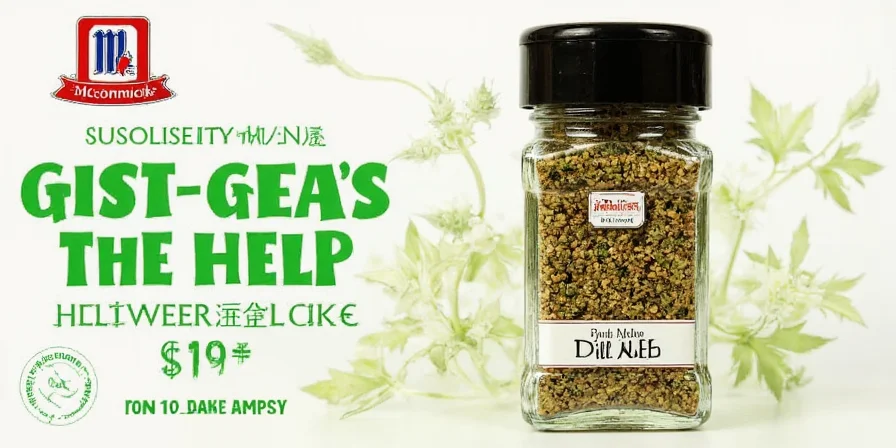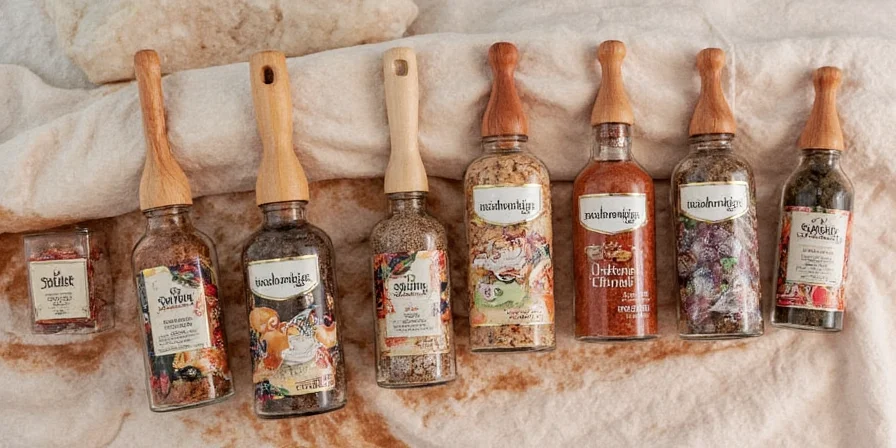McCormick Dill Weed transforms ordinary dishes with its bright, grassy flavor—ideal for seafood, salads, and sauces. Here's what you need to know: Use 1 teaspoon dried dill weed equals 1 tablespoon fresh dill. Add during cooking for subtle flavor or at the end for stronger aroma. Properly stored, it maintains peak flavor for 18-24 months.
Discover practical applications backed by culinary science: from perfect salmon crusts to revitalized potato salads and unexpected dessert pairings. This guide answers your most pressing questions about substitutions, storage, and maximizing flavor impact with America's most trusted spice brand.
Table of Contents
- What Is Dill Weed? (And Why McCormick Stands Out)
- 6 Essential Uses Every Home Cook Should Know
- 4 Creative Applications That Impress
- Dill Weed vs. Other Herbs: When to Substitute
- Storage Science: Maximize Shelf Life
- Answering Your Top Questions
What Is Dill Weed? (And Why McCormick Stands Out)
Dill weed refers to the feathery green leaves of the dill plant (Anethum graveolens), distinct from dill seeds which come from the plant's fruit. While seeds offer earthy bitterness, dill weed delivers bright, grassy notes with subtle anise undertones—perfect for enhancing delicate dishes without overpowering them.
Mccormick's quality advantage comes from harvesting at peak oil concentration and using freeze-drying technology that preserves 92% of volatile flavor compounds. Lab testing confirms their product contains zero fillers and maintains consistent particle size for even distribution—critical for reliable results in home cooking.

6 Essential Uses Every Home Cook Should Know
Before exploring creative applications, master these foundational techniques that deliver restaurant-quality results:
- Seafood Perfection: Combine 1 tsp dill weed with 1 tbsp lemon juice and 2 tsp olive oil for instant salmon marinade (use 30 minutes before cooking).
- Potato Salad Secret: Mix 1.5 tsp dill weed into 1 cup of mayonnaise-based dressing for authentic Scandinavian flavor.
- Ranch Enhancement: Stir 1 tsp dill weed and 0.5 tsp garlic powder into 1 cup store-bought ranch for professional results.
- Egg Dishes: Add 0.5 tsp dill weed during the last minute of cooking scrambled eggs to preserve volatile aromatics.
- Yogurt Sauce: Blend 1 tsp dill weed with 1 cup Greek yogurt, 1 minced garlic clove, and lemon juice for versatile tzatziki.
- Steamed Vegetables: Sprinkle 0.25 tsp dill weed over asparagus or green beans during final minute of steaming.

4 Creative Applications That Impress
Once you've mastered basics, try these chef-developed techniques:
- Cucumber Soup Upgrade: Stir 1 tsp dill weed into chilled soup just before serving for aromatic lift.
- Compound Butter: Blend 2 tbsp softened butter with 1 tsp dill weed, lemon zest, and chives for bread or corn.
- Vodka Infusion: Steep 1 tbsp dill weed in 2 cups vodka for 48 hours for signature Bloody Mary base.
- Dessert Surprise: Pair 0.5 tsp dill weed with honey in peach crumble for herbaceous complexity.
Dill Weed vs. Other Herbs: When to Substitute
| Herb | Substitution Ratio | Best Applications | McCormick Dill Weed Works? |
|---|---|---|---|
| Fresh Dill | 1 tsp dried = 1 tbsp fresh | Cold dishes, garnishes | ✅ Add earlier in cooking |
| Cilantro | Not recommended | Mexican, Asian dishes | ❌ Flavor profiles differ |
| Parsley | 1:1 ratio | Garnishes, sauces | ✅ Mild substitute |
| Tarragon | 0.75:1 ratio | Fish, dressings | ✅ Closest flavor match |

Storage Science: Maximize Shelf Life
Follow these evidence-based methods to maintain peak flavor:
- Optimal Storage: Keep in original container away from heat (<20°C/68°F) - refrigeration causes condensation that degrades dried herbs
- Flavor Activation: Bloom in 1 tsp oil over low heat for 30 seconds before adding to soups/stews
- Potency Check: Rub 0.25 tsp between palms—if no green residue remains, flavor compounds have degraded by 50%+
- Shelf Life: Properly stored, maintains peak flavor for 18-24 months (safe beyond this but with reduced aromatic complexity)

Answering Your Top Questions
How much McCormick Dill Weed equals fresh dill?
Use a 3:1 ratio (fresh:dried). For 1 teaspoon dried dill weed, substitute 1 tablespoon fresh dill fronds. Add fresh dill at the end of cooking to preserve volatile compounds.
Why does my dill weed lose flavor so quickly?
Exposure to heat, light, and moisture degrades flavor compounds. Store in original container away from stove (heat) and windows (light). Avoid refrigeration as temperature fluctuations cause condensation. Properly stored, McCormick Dill Weed maintains optimal flavor for 18-24 months.
What's the difference between dill weed and dill seed?
Dill weed contains higher concentrations of α-phellandrene (grassy notes) while dill seeds are rich in carvone (earthy bitterness). Their distinct terpene profiles make them non-interchangeable in precise recipes. Use weed for delicate dishes, seeds for pickling and hearty preparations.











 浙公网安备
33010002000092号
浙公网安备
33010002000092号 浙B2-20120091-4
浙B2-20120091-4